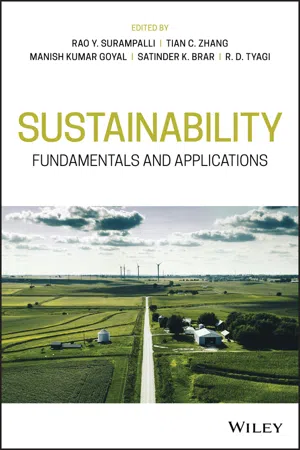
Sustainability
Fundamentals and Applications
- English
- ePUB (mobile friendly)
- Available on iOS & Android
Sustainability
Fundamentals and Applications
About this book
A comprehensive resource to sustainability and its application to the environmental, industrial, agricultural and food security sectors
Sustainability fills a gap in the literature in order to provide an important guide to the fundamental knowledge and practical applications of sustainability in a wide variety of areas. The authors – noted experts who represent a number of sustainability fields – bring together in one comprehensive volume the broad range of topics including basic concepts, impact assessment, environmental and the socio-economic aspects of sustainability. In addition, the book covers applications of sustainability in environmental, industrial, agricultural and food security, as well as carbon cycle and infrastructural aspects.
Sustainability addresses the challenges the global community is facing due to population growth, depletion of non-renewable resources of energy, environmental degradation, poverty, excessive generation of wastes and more. Throughout the book the authors discuss the economics, ecological, social, technological and systems perspectives of sustainability. This important resource:
- Explores the fundamentals as well as the key concepts of sustainability;
- Covers basic concepts, impact assessment, environmental and socio-economic aspects, applications of sustainability in environmental, industrial, agricultural and food security, carbon cycle and infrastructural aspects;
- Argues the essentiality of sustainability in ensuring the propitious future of earth systems; and
- Authored by experts from a range of various fields related to sustainability.
Written for researchers and scientists, students and academics, Sustainability: Fundamentals and Applications is a comprehensive book that covers the basic knowledge of the topic combined with practical applications.
Frequently asked questions
- Essential is ideal for learners and professionals who enjoy exploring a wide range of subjects. Access the Essential Library with 800,000+ trusted titles and best-sellers across business, personal growth, and the humanities. Includes unlimited reading time and Standard Read Aloud voice.
- Complete: Perfect for advanced learners and researchers needing full, unrestricted access. Unlock 1.4M+ books across hundreds of subjects, including academic and specialized titles. The Complete Plan also includes advanced features like Premium Read Aloud and Research Assistant.
Please note we cannot support devices running on iOS 13 and Android 7 or earlier. Learn more about using the app.
Information
Part I
Fundamentals and Framework
1
Introduction to Sustainability and Sustainable Development
1.1 Background and Definition
1.2 Basic Concepts and Issues
- “Sustainability is a people-centered and conservation-based concept that implies the development of the standard of human life by respecting nature's capacity to afford life-support facilities and resources.”
- “Sustainable development is a normative concept that exemplifies standards of decision and action to be respected as ‘the society’ strives for satisfying its needs of survival and well-being.”

Table of contents
- Cover
- Table of Contents
- Editor Biographies
- List of Contributors
- Preface
- Part I: Fundamentals and Framework
- Part II: Dimensions and Different Aspects
- Part III: Applications
- Index
- End User License Agreement